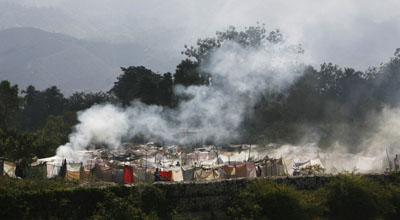
Media center in Haiti has become ‘anchor point’ for press
Three months after it opened, Haitian journalists are still benefitting from the wide-ranging services provided by the Media Operations Center, which has provided a workspace for journalists after the earthquake. While radio stations based in the capital are back on the air, the long power cuts and problems accessing the Internet are still prompting journalists…

Technicalities: 10 Questions on WikiLeaks
Monday’s release of graphic video footage of an attack by the U.S. military on two Reuters journalists vividly depicted the dangers involved in covering a battlefield. It also thrust into the spotlight WikiLeaks, the enigmatic Web site responsible for obtaining, decoding, and publicizing the footage. Here’s 10 questions answered on WikiLeaks, including how it works, its goals, and some…

Media in Leogane devastated
Of the 12 radio stations in the city Leogane, south of Haiti’s capital, Port-au-Prince, only five are back on the air more than two months after the earthquake. Most stations were seriously damaged and several broadcasters are struggling to restore transmission, the head of the Leogane Press Association (APL), Julmane Saint Fort, told CPJ. Saint…
Spain must help free Cuban dissidents
Mark Twain once said, “In our country we have those three unspeakably precious things: freedom of speech, freedom of conscience, and the prudence never to practice either.” In the witty genius’ land, the United States, such irony suggests that people should not to waste the opportunities that democracy offers. But in Cuba’s case any humorous…
For bloggers, Cuba remains a dark corner
Another year has passed and we are now remembering the seventh anniversary of the Black Spring. After seven years, have there been any changes? Yes and no. Law 88, a provision calling for the protection of Cuba’s national independence, is still in force. Known as the gag law, it is used to silence Cuban citizens,…

Haiti’s only Creole newspaper is out of business
Haiti’s sole newspaper published exclusively in Creole has disappeared under the rubble of the January 12 earthquake. The Port-au-Prince offices of the monthly Bon Nouvel (Good News) were destroyed, as were the facilities of its La Phalange printing unit, which specialized in the production of Creole-language books and documents.

For Haitian media, a big story amid big demands
In the aftermath of the January 12 earthquake, Kerby Joseph stays on the job. He helps gather news for Amikal FM, a radio station that now broadcasts from a tent in the devastated Haitian town of Leogane, where most of the buildings have been damaged or destroyed. But the radio station lacks the money to…

Journalists fleeing Haiti in aftermath of quake
Thousands of Haitians, including many journalists, have fled the country since the January 12 earthquake. Ronald Leon, a veteran journalist who worked with Haiti’s National Television station, Radio Caraibes and Tropic FM, has now settled in Florida, leaving behind his family and his journalism training school, Ameritech, which was destroyed in the earthquake. Its last class had 15 students.

French weekly gives issue over to Haitian journalists
The French weekly Courrier International opened its columns on February 4 to Haitian print media journalists in a special edition being circulated worldwide. The paper’s managers did it to express solidarity with Haitian journalists following the earthquake, which completely paralyzed the publication of the country’s dailies. The two dailies in Haiti’s capital, Port-au-Prince, Le Nouvelliste and Le Matin, were honored in the special edition. Haiti Liberté,…